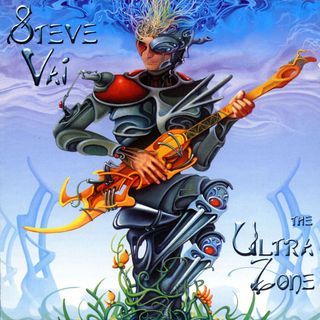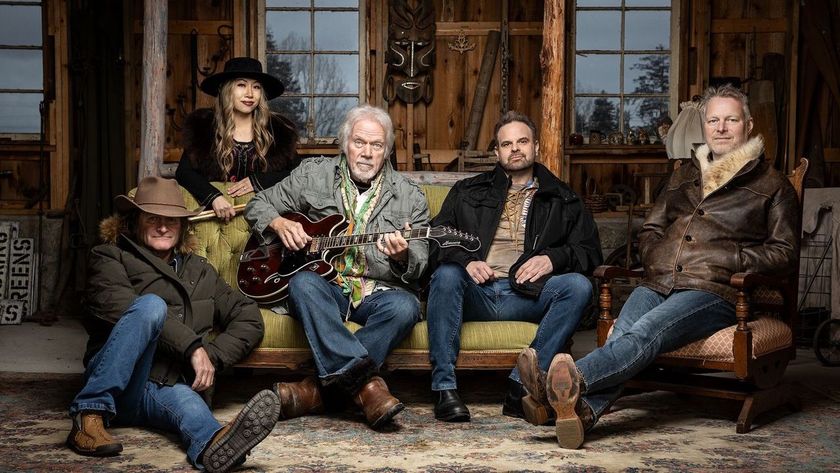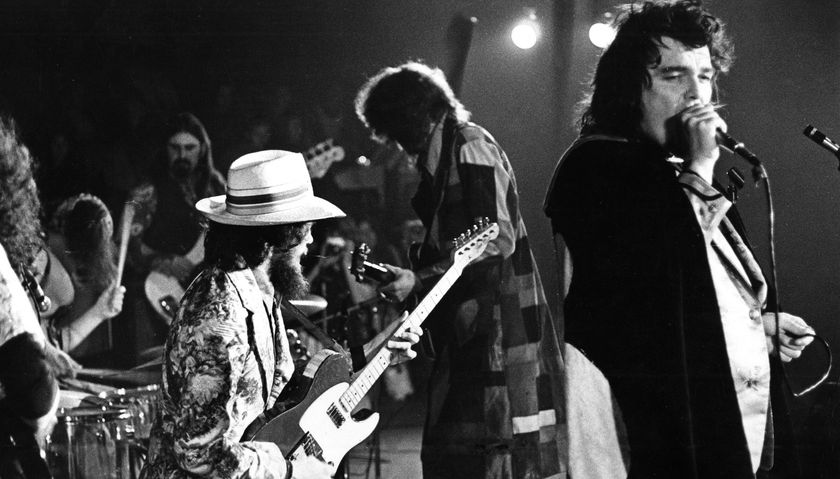From the Archive: Steve Vai Discusses His 1999 Album, 'The Ultra Zone'

Here's an interview with Steve Vai from the November 1999 issue of Guitar World.
Steve Vai has worn some outlandish costumes onstage. But if his fans saw the baggy, all-white jumpsuit, net-covered pith helmet and massive gloves he often wears around the yard of his Encino home, they would think he's completely lost his mind. This outfit is not some eccentric indulgence, however, but a necessity for Vai's latest obsession -- beekeeping. On his property are four massive hives which last spring produced more than 450 pounds of honey.
But Vai's fans shouldn't worry that their guitar hero has given up music to become a honey farmer. When it comes to music projects, Vai has been busy as a bee. Over the past two years he has reissued his 1984 solo album, Flex-Able Leftovers, produced two albums of Christmas music performed by many of the world's greatest guitarists, compiled a collection of unreleased and hard-to-find material for an upcoming 10-CD box set and released a DVD version of his instrumental album Alien Love Secrets. Even Vai's honey production has a musical angle: whatever he doesn't give to friends and family is sold to raise money for the Make a Noise Foundation, which provides music education and instruments to underprivileged young musicians.
But for Vai fans, the biggest buzz this year is his new solo album, The Ultra Zone. As eclectic as ever, Vai has released a broad-reaching effort that ranges from the whimsical "Lucky Charms" to the devastatingly heavy "Oooo...," from the serenity of "Windows to the Soul" to the raucous Stevie Ray Vaughan tribute "Jibboom." Vai has even invited some guests to join him this time around -- Japanese pop sensation B'z, who have sold more than 10 million albums in their homeland. Although The Ultra Zone features Vai singing on several songs and trading solos on ''Asian Sky" with B'z guitarist Tak Matsumoto, the album is nonetheless dominated by the style of otherworldly guitar playing and sonic experimentation that earned Vai his status as one of rock's most innovative players.
It's not surprising that, given his ambitious workload, Vai already has his eye on several upcoming projects, including a tour and an album of instrumental show tune covers performed with an orchestra and electric guitar. "I love things like West Side Story, Jesus Christ Superstar, Bye, Bye Birdie and even Evita," says Vai. "Those melodies are screaming to be played on guitar.
''Additionally, it would present a new challenge. I must admit, I'm getting weary of doing records the way I have been doing them."
GUITAR WORLD: The Ultra Zone has a spirit of exploration similar to that of Flex-Able.
Get The Pick Newsletter
All the latest guitar news, interviews, lessons, reviews, deals and more, direct to your inbox!
Some songs are very reminiscent of Flex-Able, like "Lucky Charms." At first I wanted to do a straight-ahead, experimental guitar album, but the record kept changing. I was working on compiling my upcoming box set, and I was planning to include one CD of unreleased, orchestrated-type music I had in the vault. But every time I listened to it, I felt it was some of my best stuff. I thought, What am I doing? I've got to put this on an album. So I took about half of that material -- songs like "Oooo...," "Blood and Tears" and "Frank" -- and put it on The Ultra Zone. I was compelled to put that material on there because it affected me so much when I was listening to it. As a result, the record took a big turn.
Your last two records have each had several vocal songs on them. Have you found making instrumental albums to be too limiting?
No -- it's only as limiting as my imagination. But I don't want to put any parameters on my imagination by recording only instrumental music. I'm just going to do what I feel compelled to do.
You designed the new Legacy amp with Carvin. How did that amp change your tone?
It's become much fatter. Usually I'll combine a couple of different amplifiers to make a sound, but it's so hard to get around phase cancellation. And it is so hard to create a tone that will sound good on every system and not get lost in the track. The Legacy gives me that bigger sound without having to combine a bunch of amps.
What new playing techniques did you explore on this album?
I used a Fernandes Sustainer pickup that's on one of my guitars. There are some amazing things you can do with that. You can hear it on "The Ultra Zone" and the intro and outro of "Windows to the Soul." For "Fever Dream" I used a heart-shaped, triple-neck guitar that I had made when I was with David Lee Roth. It was a prop, basically. I was thinking that I should create something with it or else I would go down in history looking like an idiot every time someone published a picture of me with it. So I tried to figure out a really cool way to use that guitar. I tuned it in a quirky way and wrote something where I was playing all three necks. I finished the song, and although I thought it was a little long, I left it as it was because the song is very entertaining to see performed.
Do you create challenges to keep yourself inspired?
I plant seeds in my head by creating an image of what I want to do. Then I water that seed, and it will start to grow. Things start to come out subconsciously. It's really surprising how that image comes into reality. For example, with "Fever Dream" I wanted to do something mind-boggling, so that when I play it I look like a wizard wielding a sword. For "Silent Within" I wanted to write lyrics that got my point across on certain spiritual issues, and I also wanted the music to reflect that. I had no riff or lyrics, but I had the intention. Then elements started to come together. When I wrote the lyrics, I sang the melody with the passion of what I wanted to portray, but I just sang senseless lyrics that made no sense. When I listened back I began to hear meaningful phrases and words.
Sometimes it's necessary to go to another level of consciousness to release an idea.
When you focus on something long enough you will enter a certain frame of mind that is like meditation. That's what I call "the Ultra Zone." I'll get into it and reach these other levels of focus on the instrument. I don't know if what I'm playing is really inspired, but it feels that way to me.
Being an educated musician, you have an advantage in being able to translate those ideas from your imagination.
You need a certain amount of training to express yourself effectively. That's why I've always been a big advocate of practicing your instrument, because it really allows you to release things that you couldn't otherwise. There is a real gratification in exploring and expressing your creative side.
The difficulty about expression is that you put your soul on display.
All artists, whether they are musicians, painters, sculptors or whatever, have these fragile little shells inside of them -- regardless of how much hair they have on their faces or how many tattoos they have on their bodies. We're fragile and we want to be accepted. When we create something, it's not a haphazard thing -- it's a reflection of our whole personality. Expression is dominated by a person's psychological makeup. Some people are angry, some are blissful, some are just dolts and some are intellectual. That will come out when they grab a pen, paintbrush, instrument or whatever means of expression they prefer. It still amuses me when people say, "That guy can play really well but he has no feeling." That's the kind of thing someone might say when they're 12.
I can't get more emotional on the guitar than with a song like "Windows to the Soul," or "Silent Within," which is on the new album. "Silent Within" is very personal and intense on a spiritual level. I wrapped up everything I am in that song and put it on the record. At that point it went out of my hands and into the world. Some people may be touched and moved by it, but others won't get it, and some may even criticize it harshly. I've taken my lumps in the past and learned how to take them. But that can't stop me from doing what I think I should.
Chris is the co-author of Eruption - Conversations with Eddie Van Halen. He is a 40-year music industry veteran who started at Boardwalk Entertainment (Joan Jett, Night Ranger) and Roland US before becoming a guitar journalist in 1991. He has interviewed more than 600 artists, written more than 1,400 product reviews and contributed to Jeff Beck’s Beck 01: Hot Rods and Rock & Roll and Eric Clapton’s Six String Stories.

"The BTO sound is BACK!!" Bachman-Turner Overdrive release first new material in over 25 years – and it features a Neil Young guitar solo

“He would beat the crap out of the guitar. The result can best be described as Jackson Pollock trying to play like John Lee Hooker”: Aggressively bizarre, Captain Beefheart's Trout Mask Replica remains one of the craziest guitar-driven albums ever made










